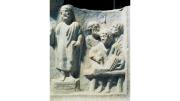In an era of TMI, one may hesitate to welcome the 881-page Information: A Historical Companion (Princeton, $65), edited by Pforzheimer University Professor Ann Blair, Paul Duguid (Berkeley), Anja-Silvia Goeing (Zurich) and Anthony Grafton (Princeton). Yet given its aims—to explore “how information has shaped and been shaped by human society across ages,” offering “views of history through the lens of information and views of information through the lens of history”—its 13 overview chapters and 101 ensuing subject entries seem a marvel of concision. Blair, a scholar of early modern European cultural and intellectual history, with a special interest in the history of the book and of reading (and a director of Harvard Magazine Inc.), crafted several entries, including on “Scribes” and “Secretaries.” From the latter, with useful reminders for a technologically enabled information age:
The work of making and managing written information, including letters, drafts, notes, documents, and administrative records, is time consuming and may require special skills such as good handwriting and spelling, and mastery of organizational systems. As a result, those responsible for this work…have often relied on helpers to carry it out.…In ancient Greece and Rome educated slaves often performed these functions; Tiro worked for Cicero both as a slave and after his manumission in 53 BCE, taking dictation, checking references, and crucially safeguarding and editing Cicero’s speeches and notes after his death. The Latin term amanuensis was commonly used to designate those who served “a manu” (by their hand, i.e., by writing)….The term secretarius and its vernacular equivalents originated in medieval Europe and emphasized the helper’s role as a confidant entrusted with secrets.…
In the twenty-first century secretary has waned in favor of other terms like office assistant; in 2000, for example, National Secretaries’ Day, established in the United States in 1952, was renamed Administrative Professionals’ Day. The people they work for are now called “principals.” The spread of personal computers used directly by said principals in addition to their assistants has generally reduced the numbers of office helpers.…
In the Renaissance a humanist education included emphasis on good handwriting, as advocated by Petrarch and Erasmus among many others.…But composition by dictation remained a good option—for John Milton in his blindness, or Winston Churchill in his great haste to compose his lengthy histories before and after World War II. Business letters were commonly dictated to clerks or secretaries, who used stenography to take down regular speech. In the twentieth century the Dictaphone made it possible to separate the dictating from the transcribing in time and place. In the twenty-first century speech recognition software has replaced a person taking dictation in many circumstances….Transcriptions by machine may be accompanied with disclaimers about garbled results, and with good reason. Similarly, early modern authors warned of the errors of amanuenses.…The making and managing of texts has long been a collaborative enterprise; the work of secretaries, often ignored as merely mechanical, is an integral part of the history of the creation and diffusion of information.









